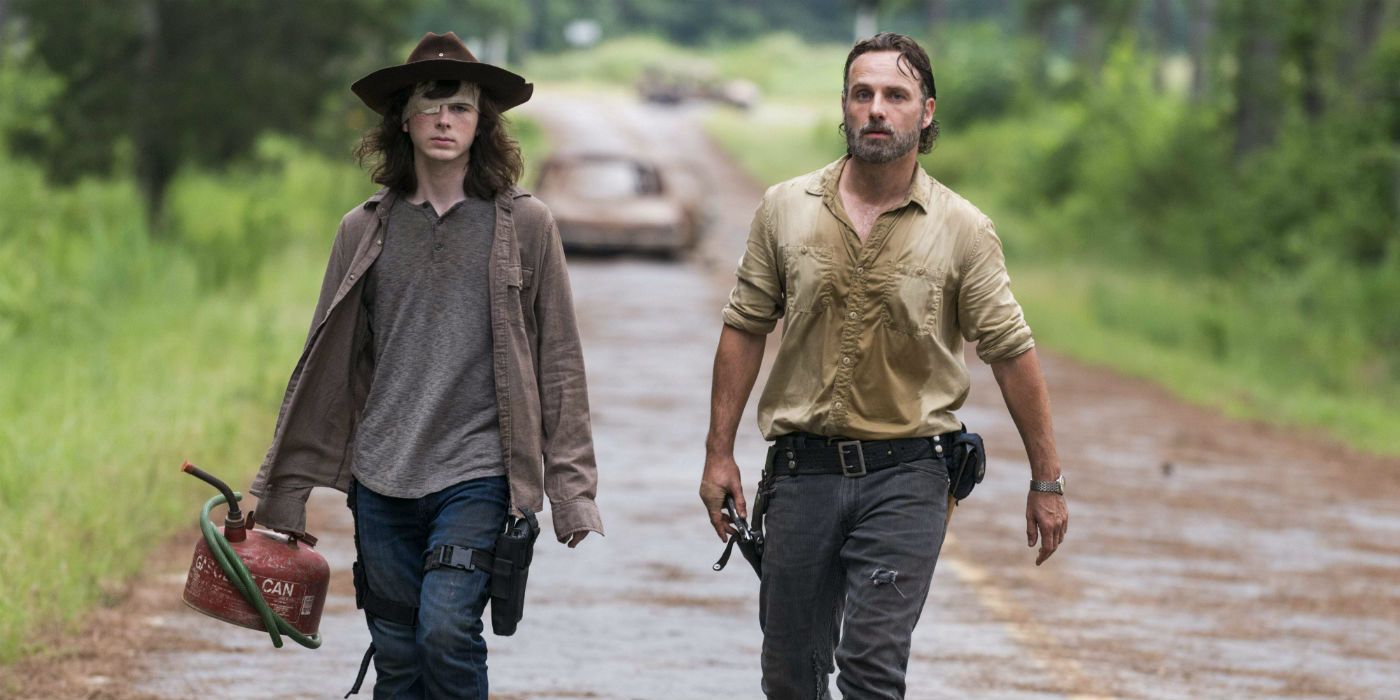Andrew Lincoln’s Rick might have been The Walking Dead‘s lead protagonist, but Carl was never far away from the spotlight. From nursing his father through a breakdown to having his eye blown out, Carl provided the focal point for some of The Walking Dead‘s biggest stories. It could even be said that Carl’s development from season 1 to season 8 is the biggest story in The Walking Dead. Carl matures from a shy and retiring young child into a slightly sadistic and violent survivalist, and then finally evolves into a balanced, compassionate individual who tempers his ruthlessness and lack of fear with a kind heart that’s willing to cooperate with enemies and aid those in need. Carl’s development is the most drastic and compelling character growth in the series and the story of a child growing up through the zombie apocalypse is perhaps the very core of The Walking Dead.
Carl’s narrative importance is highlighted by his role in Robert Kirkman’s The Walking Dead comic books. The franchise’s creator singled out Carl as his favorite figure in the series, and this could be why the entire ending of the comic revolves around Rick’s son. The final chapter of The Walking Dead takes place years into the future when Carl is a grown man with kids of his own, and humanity’s fate is told through his perspective, rather than Rick’s. Furthermore, Carl plays a significant role in the Whisperer and Commonwealth comic arcs, and the AMC adaptation has had to work around this by having other characters pick up the slack on Carl’s stories. The Walking Dead has killed off many characters in its time, but only Carl’s absence demanded entire plots be rewritten.
Due to Carl’s importance in both the comic and TV versions of The Walking Dead, Chandler Riggs’ character would’ve been the ideal replacement for Rick Grimes after Andrew Lincoln left the show in season 9. After experiencing so much development over the course of 8 seasons and on the cusp of adulthood, Carl was virtually primed to take over as a leading figure and would’ve naturally carried on Rick’s legacy by virtue of being his son. Having a younger lead might’ve re-energized The Walking Dead; instead the show opted for an ensemble approach which, despite possessing its owns merits, hasn’t provided the focal point the series needs.
Chandler Riggs Didn’t Want To Leave

Every live-action comic book adaptation has the disadvantage of dealing with real-life actors rather than 2-D drawings, and this means that the fates of certain characters are sometimes out of the show’s hands. In the case of Andrew Lincoln, for example, the British actor claimed he wanted to escape the rigors of The Walking Dead‘s hectic shooting schedule after almost a decade in the role and spend more time with his family. Despite the impact Lincoln’s departure was to have on The Walking Dead, it’s hard to argue with such reasoning and, in these circumstances, TV shows have to make the best with what they’re given.
This was not the case with Chandler Riggs. After Carl Grimes’ final episode aired, the young actor openly stated that he didn’t have any intention of leaving The Walking Dead, and was just as surprised by his character’s death as viewers were. Riggs’ father even hit out at the decision on his social media. Some fans have theorized that AMC chose to ax Carl because Riggs’ age meant he would’ve been entitled to additional benefits as a grown-up actor. Obviously, AMC have never come right out and confirmed this to be the case, but it might explain an otherwise confusing personnel change.
Carl’s Walking Dead Death Didn’t Achieve Anything

Killing off a major character when the actor isn’t showing any sign of wanting to leave could be forgiven if the death actually aided in progressing a story or character arc, but it’s difficult to argue this was true of the Carl Grimes situation. In an omen of the problems to come, the initial aftermath of Carl’s demise was poorly handled in The Walking Dead. Rick was clearly deeply upset, with Lincoln’s acting ability shining through and conveying the necessary weight and emotion of such a landmark moment. However, it wasn’t long before Alexandria’s leader had refocused and was once again set on taking down Negan. Compared to how Rick reacted when Lori died or when the prison was taken over, losing Carl doesn’t have anywhere near the long-term devastating impact on Rick that it really should have. Every move Rick made over the course of The Walking Dead was motivated by Carl, and the death of his son should’ve shaken Rick to his core. Exploring this avenue was sacrificed in order to keep the feud with the Saviors moving forward and, in truth, Rick seemed more upset after Glenn died.
Taking a wider point of view, Carl’s death has no real discernible impact on The Walking Dead‘s story. The big pay off is supposed to come during Rick and Negan’s final showdown – Rick has spent the entire season gunning for Negan’s head but when he has the villain at his mercy, Carl’s message of peace and cooperation wins out and convinces Rick to take the righteous path, sparing Negan’s life, dumping him in a cell and choosing to work with the remaining Saviors instead. As the comic books prove, however, Carl didn’t have to die in order to achieve this result. Rick makes the same decision in The Walking Dead‘s original story, but does so in a moment of personal character development, rather than being inspired by the death of his son.
In more recent episodes, Carl’s final message has looked even more meaningless. Following Rick Grimes’ disappearance, Alexandria became isolated, Carol killed off the remaining Saviors and relationships had to be built again from scratch. Carl’s already tenuous legacy on The Walking Dead had been stripped away inside a single season.
“It’s not as good as it used to be” is one of the friendlier statements used to describe The Walking Dead in 2019, and not all of the blame for this can be placed at the makeshift headstone of Carl Grimes. Nevertheless, Carl’s death is a defining moment in The Walking Dead‘s decline, and symptomatic of the ‘shock first, ask questions later’ approach that had caused problems previously. Some might claim The Walking Dead‘s tenth season has shown a marked improvement and, with the addition of the Whisperers, this praise is deserved. However, any recent upturn in quality The Walking Dead has made comes in spite of Carl’s exit, not because of it.

